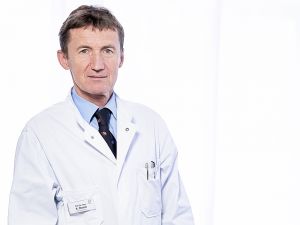Healthcare experts at SHS: Professor Dr Arnulf Stenzl

SHS enjoys a very good reputation as a specialised healthcare investor among companies and institutional investors because it draws on a strong network of experts. The medical-technical healthcare experts who support SHS and the portfolio companies play a special role here.
Professor Dr Arnulf Stenzl has been Medical Director of the Department of Urology at Tübingen University Hospital for 20 years. Born in Carinthia, he completed his medical studies in Graz and practised and researched as a specialist in urology at leading hospitals in Austria, the USA and Switzerland before accepting the call to the University of Tübingen in 2002. With his work and expertise, Professor Stenzl has contributed significantly to the fact that the Tübingen University Clinic for Urology enjoys an excellent reputation worldwide in the field of urological oncology and urological surgery. Today, Tübingen is considered one of the leading centres for all prostate diseases.
Editor: Where do you see the greatest progress in your field in recent years?
Prof. Stenzl: We are making the greatest progress in the field of reconstructive urology. By this I mean the greatest possible reconstruction of the ureter and bladder, partly also with tissue engineering. In the field of oncology, the development is that today we operate minimally invasively (if at all) and then treat in combination with immunotherapy and chemotherapy. One success story is the treatment of testicular tumours: here we have a cure rate of about 90 per cent today. In the case of prostate carcinoma, we have now reached a cure rate of 80 percent thanks to early detection, and the trend is still rising.
What developments do you expect in the next five to ten years?
Prof. Stenzl: Prognosis is becoming increasingly important, especially in prostate cancer. It is a question of deciding which tumours have to be treated, which we do not treat at all and in which cases we can wait with the treatment. Beyond that, it will be more about the question of whether we always treat the entire prostate. Whereas we have a very safe treatment option with the minimally invasive prostate surgery procedure, in which side effects can be avoided as far as possible. Today, we can compare this with a tonsillectomy or appendectomy. As far as robot-assisted surgery is concerned, I expect that there will be many new providers with high-quality surgical robots in the next few years. Already today, many benefit from this type of surgery because it allows us to keep the wound area very small. We assume that the entire field of surgery will continue to change here due to advances in medical technology. With these devices, we can perform highly precise keyhole operations with very few side effects for the patient. The prerequisite for this minimisation is, of course, intensive training of the surgeon, in advance also on the simulator.
As far as the further development of intraoperative diagnostics in minimally invasive procedures is concerned, I expect great progress in the next few years. In Tübingen, several research projects are underway in our graduate college. The goal, for example, is to use optical coherence tomography and electrical sensors to obtain findings in real time during the operation in order to be able to distinguish benign cell tissue from malignant tissue.
Is the topic of prostate cancer screening as present among men as it should be?
Prof. Stenzl: Prevention and early detection are the be-all and end-all for prostate cancer. With the PSA value we have one of the best markers for this and it becomes part of a diagnostic cascade. In addition, micro-ultrasound will be increasingly used in the future, which offers many times more precision than standard ultrasound. Or urine tests to diagnose exosomes in the urine. The Stockholm-3 test will also come to us from Northern Europe, and here, too, a urine test plays a central role. As far as prevention is concerned, this is a very important topic. Men need to be educated more and the costs of prostate screening need to be covered. It is hard to understand why the PSA test is not covered by the health insurance funds in Germany. After all, prostate cancer is the second most common cause of death in men.
What made you decide to support SHS as a healthcare expert?
Prof. Stenzl: Urology is a discipline in which medical technology has traditionally played an important role. Endoscopy, laparoscopy, lasers, etc. have been used in urology for a long time. The University of Tübingen has a joint interdisciplinary institute for medical technology with the University of Stuttgart, which I am involved in. Since my work is closely related to medical technology, it makes sense for me to contribute my experience and knowledge to the cooperation with SHS. The more practical experience that flows into the development of new medical technology, the better.
And how do you recover from your demanding job?
Prof. Stenzl: The best way for me to recharge my batteries is in the fresh air, doing endurance sports: on a racing bike, on a mountain bike, jogging in the forest and skiing in winter.
Thank you for the interview!